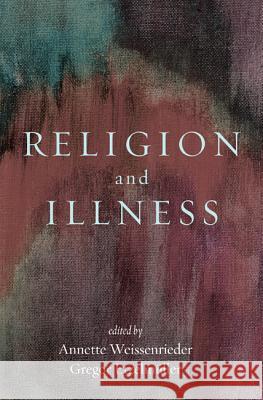Religion and Illness » książka
Religion and Illness
ISBN-13: 9781498293518 / Angielski / Miękka / 2016 / 446 str.
What are the relevant conceptualities and terminologies marking the coupling of religion and medical interpretations of illness in different religions such as Judaism, Islam, Buddhism, and Christianity? How do religious orientations influence courses of a disease? How do experiences of illness change images of the divine in late modernity? This collection of essays from a symposium held at the International Research Institute of the University of Heidelberg examines connections between religious and medical interpretations of illness in different cultures in order to suggest criteria for coupling religion and medicine in ways that enhance rather than diminish life. By discerning which relationships between religion and medicine appear to be beneficial and which harmful, the book as a whole proposes criteria that are not limited to a single scientific approach, cultural tradition, or time period (such as the present). The book has four parts, which deal with Islamic medicine, Chinese medicine, and the relationship between religion and medicine in both Jewish and Christian traditions. All chapters cover from antiquity to the present. ""Finally a cross-disciplinary scholarly compendium on religion and illness in a breathtakingly rich selection of texts, contexts, and topics. Invaluable as a resource for all interested in a more integrative approach towards medicine at the intersection of health and the holy, body and spirit, healing and theology."" --Brigitte Kahl, Professor of New Testament, Union Theological Seminary (New York) ""Illness is a pressing topic of today--and of the past, too. This book gives valuable insights into different religions and their ways of interpreting and coping with illness. The contributors write in a hermeneutic, reflecting, and transdisciplinary way, so they research understandings of illness transcending the limits of the scientific worldview."" --Christian Grethlein, Faculty of Protestant Theology, University of Munster ""Weissenrieder and Etzelmuller tell us about the concept of illness, ancient and modern, to be sure. But more than that, they and their contributors tell us how to think about our body. Actually, if we are our body, then they aid us in thinking about our self. A must for the serious student of historical and self-understanding."" --Ted Peters, Distinguished Research Professor Emeritus of Theology and Ethics, Pacific Lutheran Theological Seminary and the Graduate Theological Union Annette Weissenrieder is Professor of New Testament at San Francisco Theological Seminary and the Graduate Theological Union. She is author of Images of Illness in the Gospel of Luke: Insights of Ancient Medical Texts (2003). Gregor Etzelmuller is Professor of Systematic Theology at Osnabruck University (Germany). He is author of Was geschieht beim Gottesdienst? (2014).
What are the relevant conceptualities and terminologies marking the coupling of religion and medical interpretations of illness in different religions such as Judaism, Islam, Buddhism, and Christianity? How do religious orientations influence courses of a disease? How do experiences of illness change images of the divine in late modernity? This collection of essays from a symposium held at the International Research Institute of the University of Heidelberg examines connections between religious and medical interpretations of illness in different cultures in order to suggest criteria for coupling religion and medicine in ways that enhance rather than diminish life. By discerning which relationships between religion and medicine appear to be beneficial and which harmful, the book as a whole proposes criteria that are not limited to a single scientific approach, cultural tradition, or time period (such as the present). The book has four parts, which deal with Islamic medicine, Chinese medicine, and the relationship between religion and medicine in both Jewish and Christian traditions. All chapters cover from antiquity to the present.""Finally a cross-disciplinary scholarly compendium on religion and illness in a breathtakingly rich selection of texts, contexts, and topics. Invaluable as a resource for all interested in a more integrative approach towards medicine at the intersection of health and the holy, body and spirit, healing and theology.""--Brigitte Kahl, Professor of New Testament, Union Theological Seminary (New York) ""Illness is a pressing topic of today--and of the past, too. This book gives valuable insights into different religions and their ways of interpreting and coping with illness. The contributors write in a hermeneutic, reflecting, and transdisciplinary way, so they research understandings of illness transcending the limits of the scientific worldview.""--Christian Grethlein, Faculty of Protestant Theology, University of Munster""Weissenrieder and Etzelmuller tell us about the concept of illness, ancient and modern, to be sure. But more than that, they and their contributors tell us how to think about our body. Actually, if we are our body, then they aid us in thinking about our self. A must for the serious student of historical and self-understanding.""--Ted Peters, Distinguished Research Professor Emeritus of Theology and Ethics, Pacific Lutheran Theological Seminary and the Graduate Theological UnionAnnette Weissenrieder is Professor of New Testament at San Francisco Theological Seminary and the Graduate Theological Union. She is author of Images of Illness in the Gospel of Luke: Insights of Ancient Medical Texts (2003).Gregor Etzelmuller is Professor of Systematic Theology at Osnabruck University (Germany). He is author of Was geschieht beim Gottesdienst? (2014).











